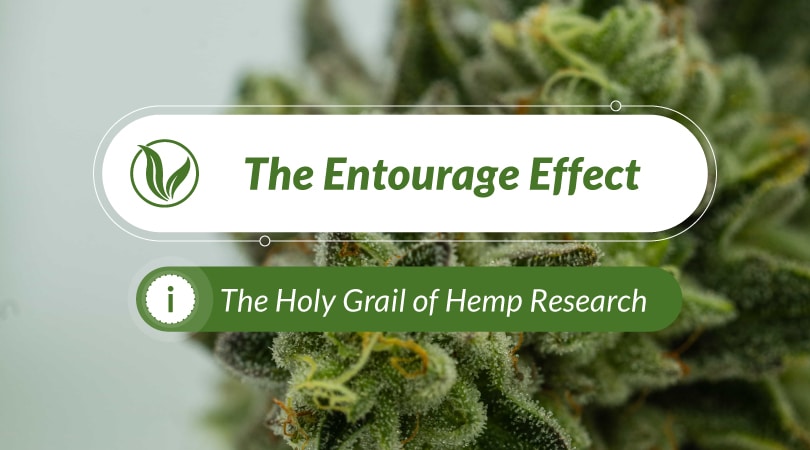
The Entourage Effect: The Holy Grail of Hemp Research
Have you ever wondered why different strains have different effects? Further, why the same strain might have different effects on different people? The answer might just be what some in the industry refer to as the “entourage effect.”
It should not come as a surprise that not all CBD products are created equal and it’s not just a matter of quality–it also depends on what type of CBD you are using. Namely: full-spectrum, broad-spectrum, or CBD isolate. Each type is meant for different needs but not all generate an entourage effect.
What Is the Entourage Effect?
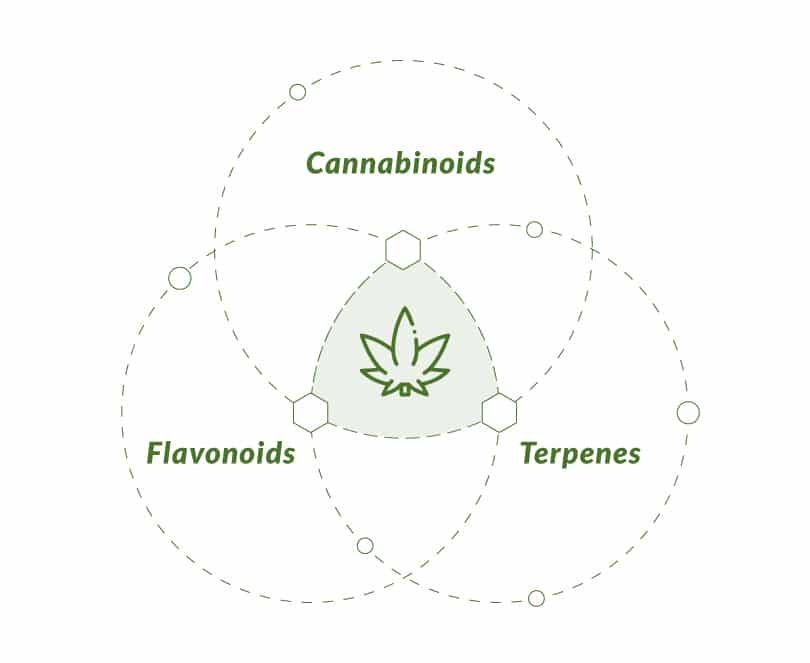
The entourage effect is a theory that suggests that all compounds of the cannabis plant work together to maximize the benefits. Think of it as a band playing in unison: there is a gifted piano player, a virtuoso guitarist, and an incredible drummer. All of them can produce amazing solo work, but it’s not until they all get together and produce a song as a group that they are able to compose songs that live forever.
The entourage effect works just like that: all the components in the cannabis plant– mainly cannabinoids, terpenes, and flavonoids – work in synergy to create a holistic effect that none of these compounds by themselves could create.
It was first proposed by Raphael Mechoulam (the first person who isolated THC in 1964) and others in 1998. Though, it was not until 2011 that more thorough research was conducted. In this study, Dr. Ethan Russo did more extensive research about the interaction that terpenoids, aka terpenes, had with flavonoids and cannabinoids, mainly CBD and THC.
However, the legality and taboo surrounding cannabis has been an obstacle to abundant research. Most of the research that is available is about THC and CBD. Just recently, scientists started to get increasingly interested in researching the many other compounds the cannabis plant has and their interaction with each other.
Terpenes, Flavonoids, and Cannabinoids & the Entourage Effect
Terpenes
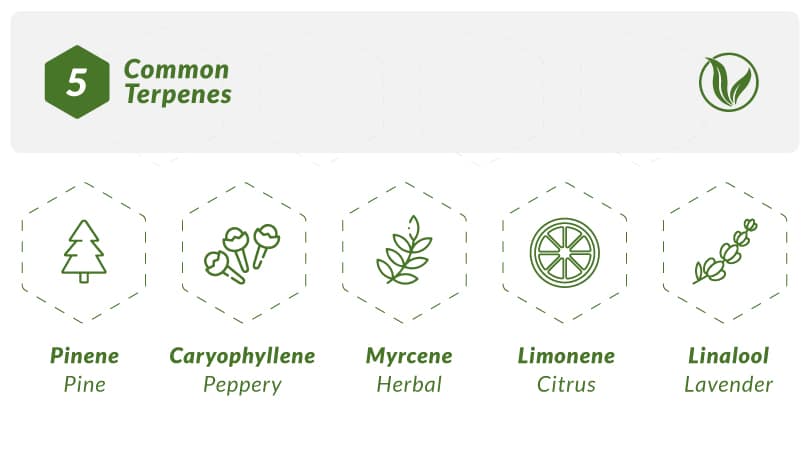
Terpenes are compounds, present in all plants, that are mainly responsible for giving them their characteristic smells and flavors. If a plant smells like citrus, it’s the terpenes that produce this smell. Moreover, the cannabis plant has a high concentration of terpenes, which, theoretically, working along with other compounds, produce the innumerable benefits cannabis (or hemp) is known for. It plays a crucial role in the entourage effect.
It was not so long ago that researchers started becoming interested in how terpenes interacted with other cannabis compounds so, although there is some research, it’s still limited.
Some of the most popular terpenes are:
- Limonene
This terpene is related to citrus smells such as lemon and orange. According to research, these are some of its properties:- Anti-inflammatory
- Antioxidant
- Anti-stress
- Possibly disease-preventing properties
- Pinene
As its name suggests, it smells like pine trees. It is also present in rosemary and basil. According to Leafly, these are some of its properties:- Anti-inflammatory
- Bronchodilator (helps open airways)
- Anti-anxiety
- Pain relief
- May be helpful with short-term memory loss associated with THC
- Linalool
Linalool is characteristic of the lavender plant. It is also one of the most popular terpenes used in aromatherapy. Some of its benefits are:- Anti-inflammatory
- Antimicrobial
- Neuroprotective
- Antidepressant
- Anticancer
- Anti-anxiety
- Myrcene
This is the most common terpene in the cannabis plant. It is also abundant in lemongrass and verbena. According to a study conducted in 2021, its main properties are:- Analgesic
- Sedative
- Antidiabetic
- Antioxidant
- Anti-inflammatory
- Antibacterial
- Anticancer effects
- Beta-caryophyllene
It’s also one of the most common terpenes in cannabis, especially in extracts that have been processed under heat for decarboxylation. It’s also very common in black pepper and cloves. Some of its properties are:- Anti-inflammatory
- Antimicrobial
- Antibacterial
- Antioxidant
- Helps with anxiety
- Some other common terpenes are phytol, camphene, and humulene, among more than 150 other terpenes.
Flavonoids
According to Healthline, flavonoids are “various compounds found naturally in many fruits and vegetables.” They are mostly known for their antioxidant properties. Unfortunately, research about flavonoids and the entourage effect in cannabis is still scarce. There are promising findings, though, such as this study, which pave the way for more specialized research in the future.
Cannabinoids
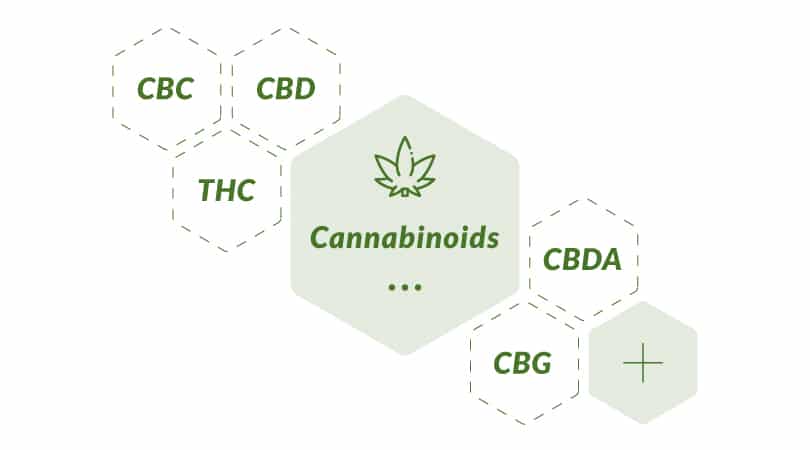
Cannabinoids are naturally occurring chemical compounds in the cannabis plant. These are the most researched compounds of the plant, especially THC and CBD. Some of the most common cannabinoids are:
- CBD
- THC
- CBG
- CBDA
- CBC
- Among more than 100 others
Types of CBD and the Entourage Effect
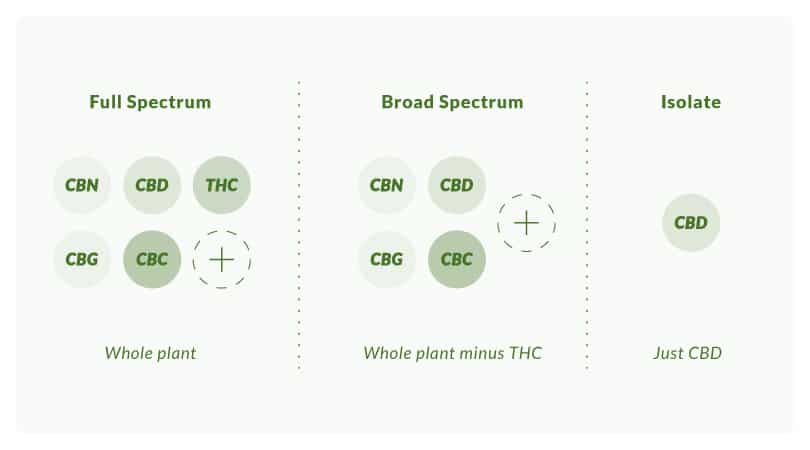
As we show above, it’s not a single compound that provides the benefits the cannabis plant offers but a combination of hundreds of compounds working in synergy. Below, we will look at each type of CBD and how likely they are to provide an entourage effect.
CBD Isolate
As its name indicates, CBD isolate is pure CBD. It has the benefits that CBD offers but to a lesser extent since it lacks interaction with other compounds to maximize CBD’s benefits.
Broad-Spectrum CBD
Broad-spectrum CBD is a combination of all the compounds of the cannabis plant except THC. It offers some benefits of the entourage effect but, without the THC, it lacks other properties that THC brings to the table.
Full-Spectrum CBD
Full-spectrum CBD has all the compounds that are present in the cannabis plant, including THC (no more than 0.3% legally). This is the perfect type of CBD for providing an entourage effect and it is the type of CBD that we offer at Vitality CBD.
Takeaway
Although cannabis has been used for thousands of years for different purposes, thorough research into the entourage effect is limited. This is mainly because of its legal status in the past and the taboo surrounding it. However, the available research and anecdotal evidence suggest that the entourage effect has a real impact on hemp users. In the near future, when there is more conclusive research, more specific products can be created to address different conditions.
Hopefully, with the 2023 Farm Bill, there will be much more clarity about cannabis and hemp-based products and the taboo around it will start evaporating.
